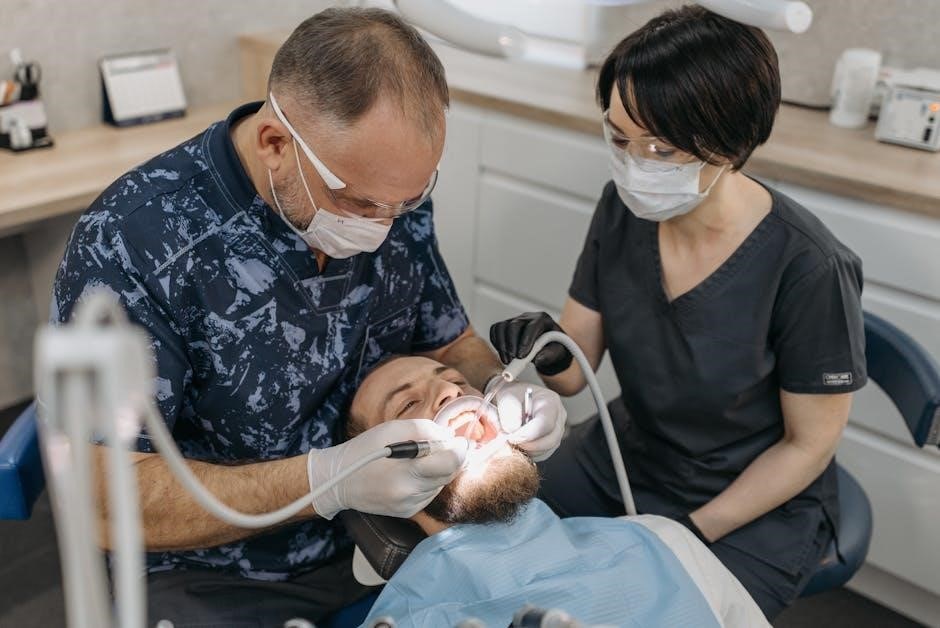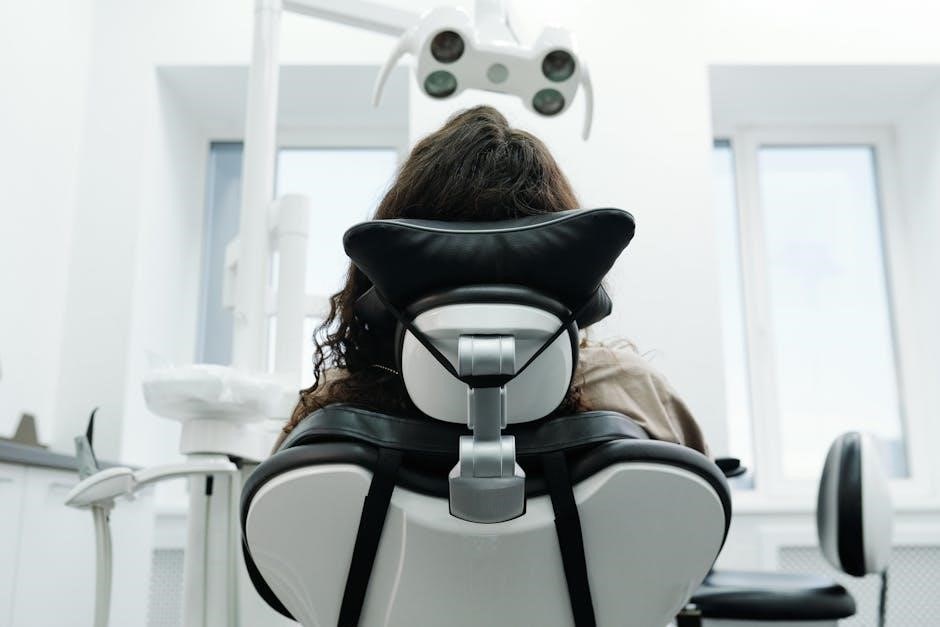This comprehensive guide is designed to help aspiring dental assistants master the essentials of the profession. It covers key topics such as roles, skills, education, and career growth, ensuring a clear path to success in dentistry.
1.1 Understanding the Role of a Dental Assistant
A dental assistant plays a crucial role in ensuring the smooth operation of a dental office. Their primary responsibilities include preparing patients for procedures, sterilizing equipment, and assisting dentists during treatments. Dental assistants also handle administrative tasks, such as scheduling appointments and maintaining records. They serve as a key link between patients and dental professionals, providing support and ensuring a positive experience for everyone involved. Understanding this role is essential for anyone considering a career in this field.
1.2 Benefits of Becoming a Dental Assistant
Becoming a dental assistant offers numerous benefits, including job satisfaction from helping patients achieve better oral health. The role provides competitive salaries and opportunities for career growth. Dental assistants enjoy variety in daily tasks, combining clinical and administrative responsibilities. Additionally, the field offers flexibility, with options to work in private practices, hospitals, or specialized clinics. It’s a rewarding career that allows for personal and professional development, making it an excellent choice for those passionate about healthcare and patient care.

Essential Skills and Qualities for Dental Assistants
Dental assistants need attention to detail, strong communication skills, and adaptability to thrive. They must balance clinical tasks with patient interaction, requiring empathy and organizational abilities.
2.1 Clinical Skills for Dental Assistants

Dental assistants must master essential clinical skills, including sterilizing equipment, preparing patients, and assisting dentists during procedures. They should be proficient in handling dental instruments and managing materials like impression trays and suction devices. Operating X-ray equipment and processing radiographs are also critical tasks. Developing these skills ensures efficient patient care and smooth workflow in dental offices, making them indispensable to the dental team.
2.2 Soft Skills for Success in Dentistry
Success as a dental assistant requires strong soft skills, including communication, empathy, and adaptability. Effective patient interaction and active listening build trust and ease anxiety. Attention to detail ensures accurate record-keeping and proper preparation for procedures. Team collaboration is essential for seamless workflow, while problem-solving helps manage unexpected challenges. These skills enhance patient satisfaction and contribute to a positive, efficient dental office environment, making dental assistants invaluable to the team.

Educational Requirements and Certifications
Aspiring dental assistants typically need a high school diploma and a CODA-accredited program. Certifications like CDA and state licenses are often required for better opportunities.
3.1 How to Choose a Dental Assisting Program
Choosing the right dental assisting program involves researching accredited schools and understanding their curricula. Use the CODA website to find programs by type, accreditation status, and state; Consider program length, hands-on training opportunities, and certification preparation. Ensure the program meets your state’s requirements for licensure. Additionally, review school reputations and ask about success rates for graduates. Visiting campuses and speaking with alumni can also provide valuable insights to make an informed decision.
3.2Certifications and Licensure Requirements
3.2 Certifications and Licensure Requirements
Certifications and licensure are crucial for dental assistants to practice professionally. Many states require assistants to be certified or registered, often through the Certified Dental Assistant (CDA) credential. Requirements vary by state, so it’s essential to check with your state dental board. Some states also require licensure or registration to perform specific duties. Certifications like the CDA demonstrate expertise and commitment, enhancing job opportunities. Stay updated on local regulations and pursue certifications to ensure compliance and career advancement.

Practical Training and Clinical Experience
Practical training and clinical experience are vital for dental assistants to gain hands-on skills in real-world dental settings. This training bridges classroom learning with actual patient care, ensuring competence and confidence.
4.1 Importance of Hands-On Training
Hands-on training is crucial for dental assistants, as it bridges classroom learning with real-world application. By practicing clinical procedures, students gain confidence and mastery in patient care. This practical exposure helps develop essential skills like equipment handling and patient interaction. Working in a clinical setting also fosters teamwork and adaptability, preparing assistants for the demands of a dental office. Real-world experience ensures they are well-prepared to assist dentists effectively and provide quality care. This training is indispensable for building a successful career in dentistry.
4.2 Working with Dental Teams and Patients
Collaboration with dental teams and patients is a cornerstone of a dental assistant’s role. Effective communication and teamwork ensure seamless coordination between dentists, hygienists, and support staff. Dental assistants act as liaisons, addressing patient concerns and preparing them for procedures. Building rapport with patients, especially those anxious or fearful, requires empathy and strong interpersonal skills. This interaction fosters trust and contributes to successful outcomes. Working cohesively with the dental team enhances efficiency, while patient-focused care ensures a positive experience. These interactions are vital for both patient satisfaction and practice success.

Job Responsibilities and Daily Tasks
Dental assistants prepare patients for procedures, handle instruments, and maintain sterilization. They also assist dentists during treatments, manage administrative tasks, and ensure smooth office operations daily.
5.1 Common Duties in a Dental Office
Dental assistants prepare patients for treatments, ensuring they are comfortable and informed. They sterilize equipment, handle instruments during procedures, and assist dentists with various tasks; Administrative duties include scheduling appointments, managing patient records, and processing payments. They also educate patients on oral hygiene and maintain office organization. These responsibilities require attention to detail, strong communication skills, and the ability to multitask effectively in a fast-paced environment.
5.2 Patient Interaction and Communication
Dental assistants play a crucial role in patient interaction, ensuring a positive experience. They greet patients, address concerns, and explain procedures clearly. Effective communication helps ease anxiety and builds trust. Assistants often educate patients on oral hygiene and post-care instructions. Strong interpersonal skills are essential for handling nervous patients and creating a welcoming environment. Clear and empathetic communication fosters patient satisfaction and strengthens the dental team’s relationship with clients.

Salary, Benefits, and Career Growth
Dental assistants earn a competitive salary, with benefits like health insurance and paid leave. Opportunities for advancement include specialization or leadership roles, enhancing career growth.
6.1 Average Salaries for Dental Assistants
Dental assistants earn an average salary ranging from $40,000 to $60,000 annually, depending on location, experience, and employer type. Urban areas and specialized clinics often offer higher pay, while rural settings may have lower rates. Experienced assistants typically earn more, with senior roles reaching up to $70,000. Additionally, certifications like CDA (Certified Dental Assistant) can significantly boost earning potential. Salaries vary by state, with regions like California and New York tend to offer higher compensation due to living costs and demand.
6.2 Opportunities for Advancement
Dental assistants have numerous opportunities for career advancement. With additional education and certifications, they can become dental hygienists, office managers, or even pursue dentistry. Specializing in orthodontics, pediatric dentistry, or oral surgery can also open doors. Experienced assistants may move into leadership roles or start their own practices. Continuing education and certifications, such as CDA (Certified Dental Assistant), enhance career prospects and earning potential. The growing demand for dental care ensures long-term job security and diverse advancement pathways.

Frequently Asked Questions (FAQs)
This section addresses common questions about the role, education, and career paths of dental assistants. It provides practical advice and tips for succeeding in the field.
7.1 Common Questions About Dental Assisting
Prospective dental assistants often ask about the daily responsibilities, required skills, and educational pathways. They also inquire about career growth opportunities and the challenges of the role. Many wonder if certification is necessary and how to choose the right program. Additionally, questions arise about patient interaction, the importance of hands-on training, and how to excel in a competitive job market. These FAQs provide clarity and guidance for those considering a career in dental assisting.
7.2 Tips for Succeeding in the Field
To excel as a dental assistant, focus on building strong communication skills and attention to detail. Stay updated on the latest techniques and technologies by pursuing ongoing education. Cultivate a positive attitude and adaptability to thrive in fast-paced environments. Prioritize patient comfort and safety, and maintain a clean, organized workspace. Developing empathy and strong interpersonal skills will enhance your interactions with patients and dental teams. Continuous learning and a commitment to excellence are key to long-term success in this rewarding career.
This guide provides a comprehensive roadmap for aspiring dental assistants, offering insights into roles, education, and career growth. Embrace the opportunities and challenges with confidence and dedication to excel in this rewarding field.
8.1 Final Thoughts on Becoming a Dental Assistant

Becoming a dental assistant is a rewarding career choice that offers the opportunity to make a positive impact on patient care. With the right combination of skills, education, and dedication, you can thrive in this dynamic field. Remember, attention to detail, strong communication, and adaptability are key to success. As you embark on this journey, stay passionate about continuous learning and growth, ensuring you provide exceptional support to dental teams and patients alike.
8.2 Encouragement for Future Dental Assistants
Embarking on a career as a dental assistant is an exciting and rewarding journey. You will have the opportunity to make a profound impact on patients’ lives while working in a dynamic and growing field. Stay curious, embrace challenges, and continuously seek growth. With dedication and passion, you can advance in your career and become an indispensable member of a dental team. Remember, every smile you help create is a testament to your hard work and compassion;



